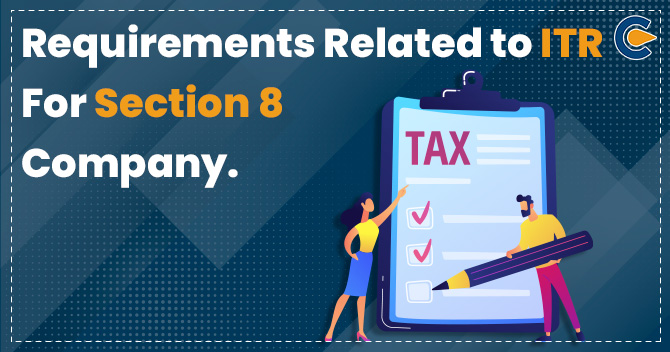Section 8 Company is a company formed under the Companies Act, 2013 to promote art, science, commerce, research, religion, environmental protection, education, charity, sports, or any other purpose, with the condition that the profit is used to advance the purpose. Hence, in this blog, we will discuss the requirements related to ITR for Section 8 Company. In addition, we discuss the exemptions and benefits of a company incorporated as a non-profit organization under Section 8 of the Companies Act, 2013.
Individuals and businesses can file an Income Tax Return through the ITR 7 Form under:
- Section 139.4A
- Section 139.4B
- Section 139.4C
- Section 139.4D
- Section 139.4E
- Section 139.4F
Hence, Form ITR 7 need to be submitted under Section 8 Companies & other Forms of non-profit businesses.
Benefits Associated with Section 8 Company Incorporation
- The mission and goal of the organization can perform a wide variety of operations, faithfulness and obtain integrity by founding a Section 8 Company since it is an authorized department by the Central Government.
- Section 8 Companies have more credibility than societies or other forms of charity organizations.
- In comparison to societies, it has a more dependable image in front of external & internal users of details due to its tight operational compliances.
- In contrast to Societies or Trusts, Section 8 Companies get essential subsidies and permits from the Government & other entities.
Eligibility Criteria for Filing a Form 7 ITR for Section 8 Company
Following is the list of the eligibility for filing a Form 7 ITR for Section 8 Company:
Exemptions & Reliefs for Section 8 Company under Diverse Rules, Regulations, & Acts
- Companies Act of 2013: ITR for Section 8 Company
- Directorships in Section 8 Company shall not be considered for computing the maximum No of directorships stipulated in Section 165 of the Company Act.
- Instead of 4 meetings every year, a Section 8 Company may convene a minimum of 1 meeting every 6 months.
- A general meeting might be convened by giving 14 days’ notice rather than 21 days.
- Minute recordings of General Meeting, Board Meeting, and other resolutions are not required for a Section 8 Company. However, the time of meetings is recorded no more than 30 days after the meeting’s end if the Company’s articles offer confirmation from the dissemination of minutes.
- Section 149.1 of the Companies Act cannot apply to Section 8 Companies; hence, they are not required to nominate an Independent Director. Moreover, for the reasons stated above, a Section 8 Company’s Audit Committee is not required to include Independent Directors on its Board.
- An enterprise may also be a part of a Section 8 Company.
- Section 8 entities are not needed to designate a verified corporate secretary.
- Section 178 of the Companies Act does not apply to Section 8 Company. Hence, Section 8 Companies are exempt from having a Remuneration Committee & Nominee or a Stakeholders Relationship Committed.
- This is also free by the application of secretarial standards.
Income Tax Act of 1961: ITR for Section 8 Company
Section 8 Company is exempted by certain income tax requirements if a company’s vital operation has “charitable reasons” as defined in Section 2.15 of the 1961 Income Tax Act. In addition, they qualify for a variety of additional tax deductions & breaks under Section 80G of the Income Tax Act, 1961.
The following is a list of reliefs and exemptions that each Section 8 Company can obtain:
- Section 8 entities need to pay considerably lower stamp duty than other companies. As per Section 8 of the Income Tax Act, 1961 Company, contributors are entitled to a 50% tax advantage for their contributions.
- Each year, the Central Government introduces several regulations to provide for the tax that is more advantageous exemption circumstances for non-profit organizations.
- It is valid for 1 to 3 years, as stated in Section80G. Suppose a Section 8 entity is registered under Section 12AA of the Income Tax Act; in this case, profits are entirely exempt, and taxes are not charged to the companies.
Indian Stamp Act of 1899: ITR for Section 8 Company
The stamp duty on Memorandum of Association (MOA) & Articles of Association (AOA) of Section 8 Company or any increase in overall share capital is controlled by the Indian Stamp Act, as implemented by every State or the Stamp Act of an individual State, as applicable. Including New Delhi and Maharashtra, offer preferential prices for stamp duty on MOA or AOA of Section 8 entities or increase in authorized share capital.
Regulation Act & Foreign Contribution: ITR for Section 8 Company
To obtain funding from overseas sources, a Section 8 Company need to register with the Foreign Contribution Regulation Act[1]. Moreover, registration under the Foreign Contribution Regulation Act is essential when it comes to claiming the Act’s Advantages and reliefs.
Conclusion
We hope that we were able to clear up any questions you had about the requirements related to ITR for Section 8 Company. According to the Income Tax Act, organizations that carry out social functions, such as trusts, organizations, businesses with the real estate used for charitable and religious purposes, hospitals, educational institutions, etc., are required to file returns. When filing their Income Tax Returns, the aforementioned businesses must file the ITR-7 Form.
Read our Article:What are Section 8 Companies? Know its provisions and Incorporation Procedures











